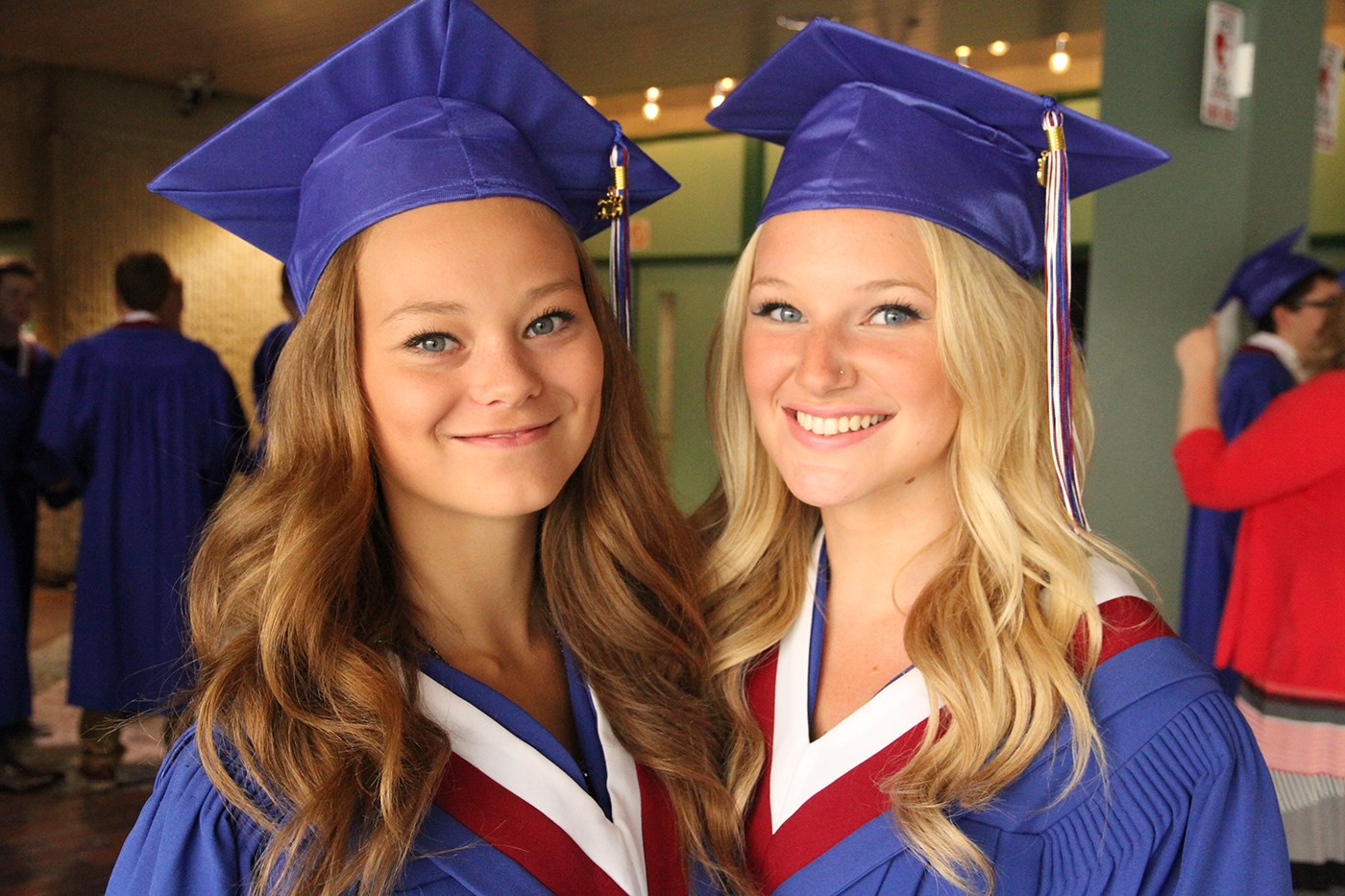The
Senior Years in SJASD offer a varied
curriculum to meet the needs, interests, and abilities of students. The
program provides a sound basis for further education or immediate
employment.
Structure: Manitoba Education, Training and Youth's senior year structure includes Grade 9 to Grade 12.
Semester System:
The majority of senior courses in collegiates are taught on a semester
system; the course runs from September to the end of January or
February to the end of June. Some courses are taught from September to
June and are referred to as 'non-semestered.' Each student is
"timetabled" individually depending on the courses selected.
Credit System: The
credit system provides a framework enabling students to pursue programs
best suited to their individual needs and aspirations. A student may
earn one credit by successfully completing a course of study. Half
credits may be earned in a similar manner. A minimum of 30 credits is
needed to complete the senior level for students in the St.
James-Assiniboia School Division.
Attendance Policy: Students
are expected to be in their scheduled classes on time. With the
exception of Grades 9 and 10 students who are fully timetabled, schools
have an open campus for those students with unscheduled time. Students
may choose to study/read in the library, to socialize in the cafeteria,
or to leave the building. The granting of course credits on a per
subject basis is conditional on meeting the school attendance
requirements. School administration may grant excused absence status for
student illness, religious holidays, family emergencies and other
special circumstances arranged and confirmed before hand by the parent
or guardian.
Course Selection: Course numbering is made up of a 3-character, alphanumeric
code. The first and second characters are numbers, while the third is a
letter.
First Character
1 - courses developed for Grade 9 2 - courses developed for Grade 10 3 - courses developed for Grade 11 4 - courses developed for Grade 12
Second Character
0 - developed or approved by the province for 1 credit
5 - developed or approved by the province for 1/2 credit
1 - developed by the school or division and approved or registered by the province
2 - developed elsewhere, such as university, out of province, and out-of-country
Third Character
Courses
in each subject are identified as foundation, general, specialized,
advanced, modified, individualized, or English as a Second Language.
F - Foundation: educational experiences, which are broadly based and appropriate for all students.
G - General: general education experiences for all students.
S - Specialized: learning experiences and skills leading to further studies at the post-secondary level.
A - Advanced: academically challenging courses, which go beyond curriculum expectations for general and specialized courses.
M
- Modified: educational experiences intended for students with specific
cognitive disabilities and where the provincial subject area curriculum
outcomes have been modified by 50% or more to take into account the
learning requirements of a student; Individual Education Plan (IEP) is
required for each student.
I - Individualized: educational
experiences intended for students with significant cognitive
disabilities and that are developmentally and age appropriate and highly
individualized to take into account the learning requirements of the
student; an Individual Education Plan (IEP) is required for each
student.
E - ESL: educational experiences designed to assist students
for whom English is not a first language in making a transition into
the English program.

Graduation Certificates:
The Academic Certificate
is awarded to students who successfully complete a minimum of 30
credits, including Grades 9, 10 and 11 compulsory subjects, and four
Grade 12 level credits (two of which must be English and Mathematics).
The Technology Education Certificate
is awarded to students who successfully complete a minimum of 30
credits including compulsory academic and technology requirements.
The Senior School French Immersion Diploma
is awarded to students who earn a minimum of 30 credits in Grades 9 to
12 including 14 credits earned in courses taken in the French language,
and who complete all the other requirements for graduation. French
Immersion students must complete the compulsory English Language Arts
courses in Grades 9 to 12. In Grade 9, français, mathematiques, sciences
humanes, and sciences de la nature are required subjects. In Grade 10,
français, mathematiques, sciences de la nature and geographie are
required subjects. In Grade 11, français, histoire and mathematiques are
required. In Grade 12 required subjects include français,
mathematiques, and one other course taken in French.
Specific Programs:
These programs are subject to sufficient student enrollment. There are
several unique programs offered at the senior level. These programs are
designed to meet the varied needs of a student population and to provide
challenging learning opportunities for students of all abilities.
Please read further for more information on these programs.
Advanced Placement: This
program gives students the opportunity to take university level courses
in Grade 12 while still at the senior level. Upon entering college or
university, students may receive advance placement and/or university
course credit for the AP subjects they complete. With the flexibility of
the program, students may select a single subject or more depending on
their areas of interest. Students first complete the Manitoba curriculum
and go on to the challenge of an advanced curriculum.
Performing Arts Program: The
Performing Arts Program offers students a full range of academic
courses, as well as an enriched arts education for students with a
demonstrated talent in music, drama, dance and visual arts. The
students' days consist of academic classes and the arts. In this milieu,
the arts become the focus of the program, which develops the creative
potential of the artistically talented students. The goals of the
program are to enrich and to accelerate aesthetic development, to
stimulate creativity and critical thinking, and to create a lasting
respect for learning within the climate of academic and artistic
excellence.
Cooperative Education: This is a
unique on-the-job learning experience offered to students. Job
placements are found for each student accepted into the program and in
each of Grade 11 and Grade 12, credits may be earned for time spent at
the work site. Cooperative education allows the student the opportunity
to explore a career path, which may lead directly to employment or
apprenticeship upon graduation.
French Immersion: This
challenging program is for students who have successfully completed at
least two years in the French Immersion program, and who want to
continue to improve their French language speaking, reading and writing
skills. The ultimate goal of this program is functional bilingualism,
and the minimum of 14 courses taken in French in Grades 10, 11 and 12
should ensure that students who complete the program successfully will
be prepared to pursue the study of French in university, or to attend a
French language or bilingual university, if that is their desire. All
subjects in the Immersion program meet the same objectives as subjects
taken in the English program, with the added benefit of intensive work
in the French language.

Skilled Trades and Technology: Courses in these programs are structured to provide job-entry skills in a specialized area, general knowledge, or to help prepare for post-secondary schooling. Students may combine the heavy skilled trades and technology courses with general and specialized courses. Courses are available in the following areas at specific schools: Auto Body, Automotive Technology, Commercial Aviation Pilot Ground School, Hairstyling, Electrical Trades Technology, Woods technology, Culinary Arts, Graphic Arts, Industrial Welding, Media Productions, and Digital Media Design. Autobody Technology. Note: Auto Body is offered at St. James Collegiate. Hairstyling is offered at St. James Collegiate and Collège Sturgeon Heights Collegiate. All other courses are offered at Collège Sturgeon Heights Collegiate. HSAP (High School Apprenticeship Program) is offered in certain courses as well apprentice accredited hours.
Students with Special Needs: This
program provides for students with special learning needs by
emphasizing the development of practical academic skills based on
individual programming in an integrated setting. Independent living
skills and desirable work habits and attitudes are the focus of an
extensive community-based work experience program.
Awards and Scholarships: A
number of financial awards are available each year to Grade 9, 10, 11
and 12 students. Students in all programs are encouraged to be aware of
and to strive for these awards.
Questions from Parents:
How may I ensure the success of my son/daughter in his/her senior years program?
There
must be ongoing communication among the student, parent, and school.
Parents should help their children balance the time spent on
school-related work, part time jobs, and any co-curricular activities.
Is my son/daughter able to drop a course without my knowledge?
No.
You will be informed by phone or letter. However, once the student has
reached the age of 18, he/she may drop a course without parental
knowledge.
Can program/courses be changed at certain times during the Senior Years?
Yes, in consultation with the administration and/or school counsellor.
Is there financial assistance available to students while they are in school?
Financial
assistance may be through City Welfare or Income Security for students
aged 18 or older. Families/students must give evidence of financial need
to the respective agencies.
What options exist for students who fail a course?
If
the course is compulsory, the student will have to repeat it -- either
at summer school or during a subsequent school year. An advantage of the
semester system is students may be able to retake the course the next
semester. If the course is not compulsory, students may take a different
course.
How/when will I be informed of my son/daughter's attendance?
Attendance
profiles are sent home on a monthly basis. As well, you are advised by
phone, on a daily basis, if your son/daughter has an unexcused absence.
Student attendance is included on the report cards issued in November,
February, April and June. If parents are concerned, they are encouraged
to contact the school. Poor attendance does affect you son/daughter's
standing.
Note: Collegiates keep track of senior level student attendance on an individual subject period by period basis.
What courses are required in Grade 9?
All
students must take English, Mathematics, Science, Social Studies,
Physical Education, plus option courses to ensure they are fully
timetabled. Please contact the high schools and request a copy of their
course description booklets for a complete listing of compulsory and
complementary courses.
Community Involvement Activity:
Every student who begins senior years (Grade 9) in the St.
James-Assiniboia School Division will be required to complete 40 hours
of community involvement in order to receive a Division diploma. The
purpose of this requirement is to encourage students to develop an
understanding of the various roles they can play in their community and
to help them develop a greater sense of belonging within the community.